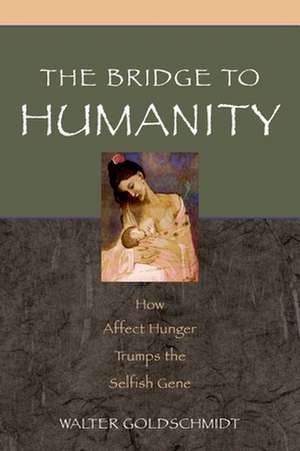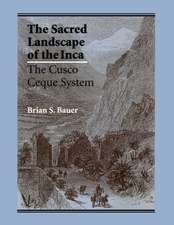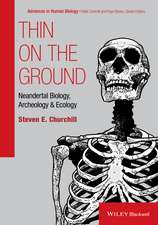The Bridge to Humanity: How Affect Hunger Trumps the Selfish Gene
Autor Walter Goldschmidten Limba Engleză Paperback – 24 aug 2005
"Affect hunger"--the need for affective expressions from others--underlies nurturance and mutuality. Goldschmidt contends that affect hunger--in combination with other factors unique to the human species--in effect "trumps" the selfish gene and is therefore the essential missing key to understanding human behavior. Employing discussions of primate behavior, ethnographies, cognitive studies, psychological research, and hormonal and neurological studies, he demonstrates how affect hunger not only provides a reward system for learning language and other cultural information, but also remains a motive for social behavior throughout life. Transforming the debate on nature versus culture to one on nature and culture, The Bridge to Humanity provides a fresh perspective on the ways that biology and culture fit together. Indeed, in this book Goldschmidt reinterprets anthropological knowledge, profoundly affecting all students concerned with human behavior and reaching far beyond the discipline's borders.
Preț: 596.02 lei
Preț vechi: 774.06 lei
-23% Nou
Puncte Express: 894
Preț estimativ în valută:
114.06€ • 117.67$ • 96.54£
114.06€ • 117.67$ • 96.54£
Carte tipărită la comandă
Livrare economică 05-19 martie
Preluare comenzi: 021 569.72.76
Specificații
ISBN-13: 9780195179668
ISBN-10: 0195179668
Pagini: 164
Dimensiuni: 155 x 210 x 12 mm
Greutate: 0.21 kg
Editura: Oxford University Press
Colecția OUP USA
Locul publicării:New York, United States
ISBN-10: 0195179668
Pagini: 164
Dimensiuni: 155 x 210 x 12 mm
Greutate: 0.21 kg
Editura: Oxford University Press
Colecția OUP USA
Locul publicării:New York, United States
Descriere
In The Bridge to Humanity: How Affect Hunger Trumps the Selfish Gene, renowned scholar Walter Goldschmidt demonstrates that culture operates by means of biological mechanisms that came into being by an evolutionary process. Central to the book's main focus is the recognition of the separate evolutionary origin of what we call love: sexual and nurturant. These ancient heritages demand very different forms of behavior; one essentially competitive and the otherconcerned with mutuality. Underlying nurturance is the phenomenon of "affect hunger," an urge to seek the affection that is needed for the proper development of the neurological system in humans and other social mammals. Goldschmidt analyzes how affect hunger not only provides a reward system for learninglanguage and other cultural information, but also remains a motive for social behavior throughout life.












